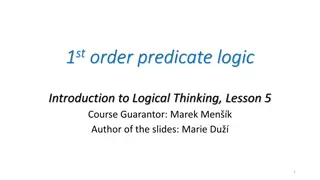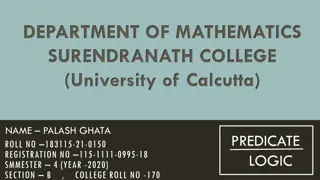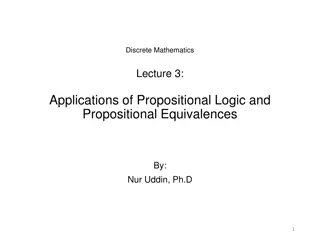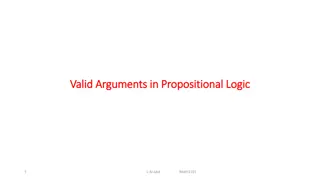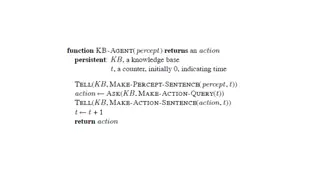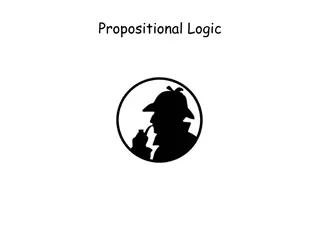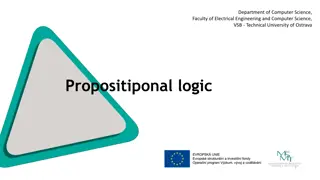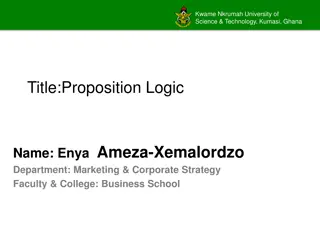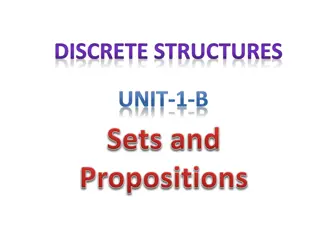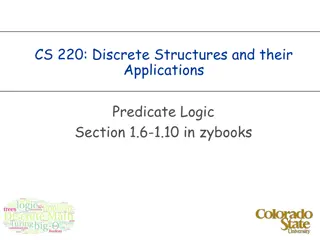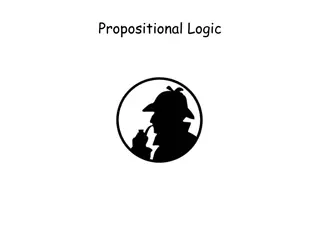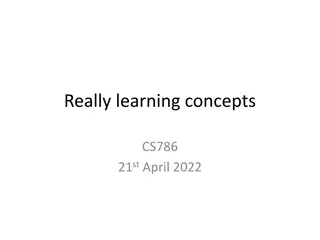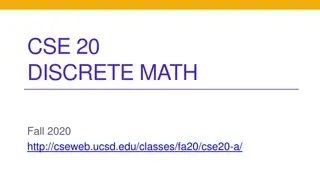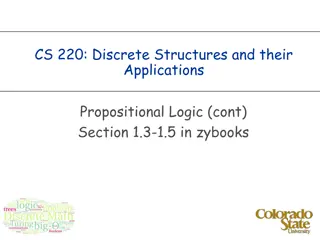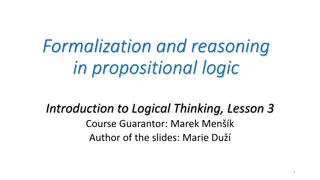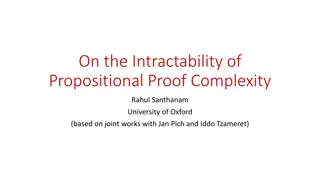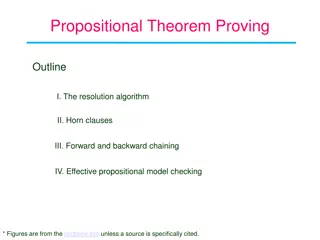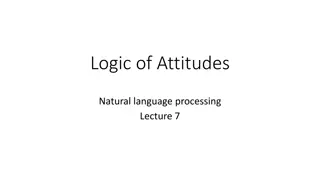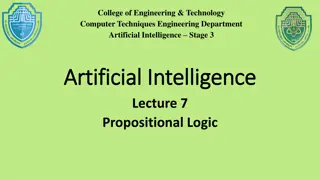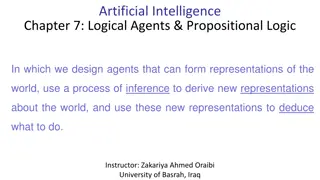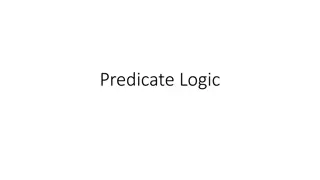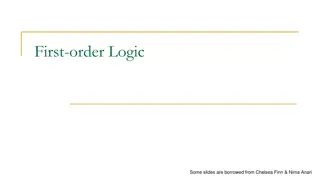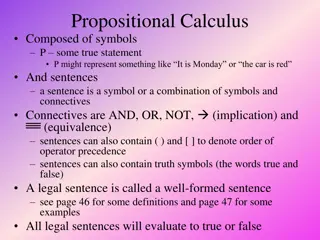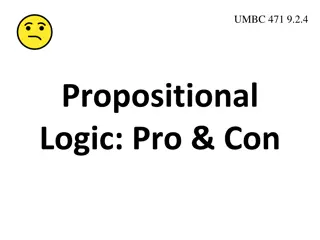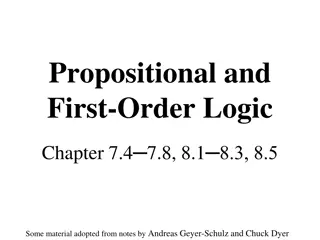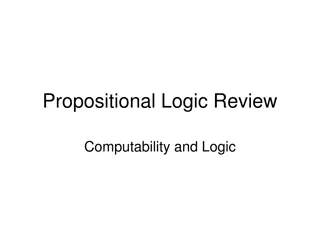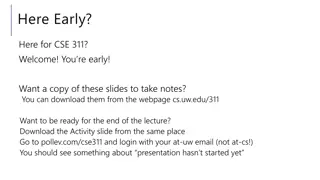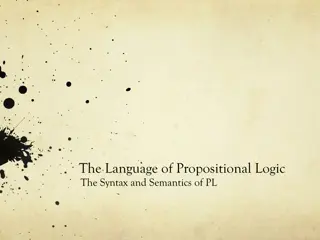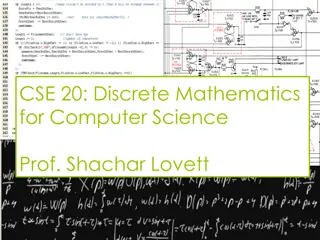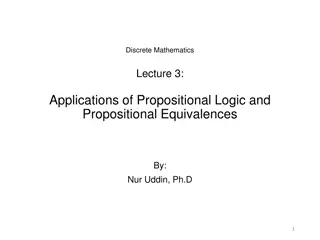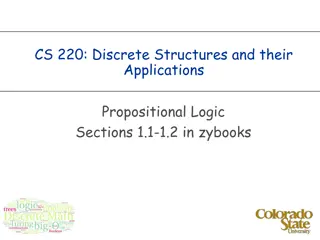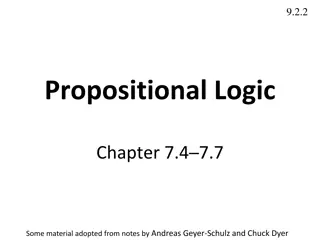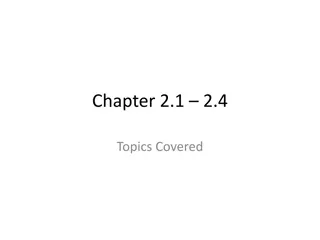Discrete Mathematics
Explore the foundations of logic and proofs in discrete mathematics, focusing on compound propositions, bit operations, and applications of propositional logic. Learn about how computers use bits for information representation and manipulation, and delve into translating English sentences into logic
7 views • 15 slides
Introduction to 1st Order Predicate Logic in Logical Thinking
Explore the limitations of propositional logic and the enhanced expressive power of 1st order predicate logic (PL1). Understand how PL1 allows for analyzing the structure of atomic propositions and proving arguments that depend on these structures. Through examples and valid argument schemata, delve
1 views • 26 slides
Introduction to Predicate Logic in Mathematics
Predicate logic is a powerful tool used in mathematics to express complex relationships and assertions that cannot be adequately represented by propositional logic. It allows for the quantification of statements over a range of elements using predicates and quantifiers like universal and existential
3 views • 13 slides
Applications and Equivalences in Propositional Logic
This lecture explores applications of propositional logic, including translating sentences, system specifications, logic puzzles, and logic circuits. It also defines tautology, contradiction, and contingency as types of compound propositions, along with logical equivalences. Examples and illustratio
0 views • 16 slides
Valid Arguments in Propositional Logic
An argument in propositional logic consists of premises leading to a conclusion. Valid arguments are those where the truth of the premises implies the truth of the conclusion. To determine validity, you can construct a truth table to check if the conclusion always holds when all premises are true. T
1 views • 9 slides
Forward Chaining in Propositional Logic
Forward chaining in propositional logic is a recursive, stack-based version of back-chaining that can be modified to handle variables using unification and negation context. By applying a set of rules and facts, the process aims to prove a given query by iteratively inferring new information. Illust
1 views • 11 slides
Propositional Logic and Logical Operators
Learn about propositional logic, statements, logic operators, compound statements, exclusive-or, logical equivalence, and writing logical formulas for truth tables. Explore how to create compound statements for exclusive-or using different approaches and ensure logical equivalence. Enhance your know
1 views • 26 slides
Normal Forms in Propositional Logic
Explore the concept of normal forms in propositional logic, where each formula has a unique truth-value function. Learn about equivalence of formulas, determining normal forms, and canonic forms like Disjunctive Normal Form (DNF) and Conjunctive Normal Form (CNF). Discover how to find canonic forms
2 views • 22 slides
Propositional Logic at Kwame Nkrumah University
Dive into the world of symbolic logic and compound statements with a focus on Propositional Logic at Kwame Nkrumah University in Ghana. Explore the concepts of connectives, simple and compound statements, truth values, and more. Enhance your logical reasoning skills through a tutorial on symbolic lo
1 views • 57 slides
Propositional Logic and Mathematical Logic in Computer Science
Study the development of formal logic in computer science, focusing on propositional logic and mathematical logic. Learn about propositions, logical operators, and ways of combining statements to derive conclusions. Explore examples and understand how to determine the validity of arguments using log
0 views • 38 slides
Predicate Logic: From Propositional to Predicate Logic
Transitioning from propositional to predicate logic allows reasoning about statements with variables without assigning specific values to them. Predicates are logical statements dependent on variables, with truth values based on those variables. Explore domains, truth values, and practical applicati
0 views • 34 slides
Propositional Logic Concepts
Explore different facets of propositional logic, including conditional statements, logic operators, logical equivalence, contrapositives, and proofs. Delve into the intricacies of if-then statements, logical negations, and the nuances of if, only-if conditions. Enhance your understanding of proposit
0 views • 25 slides
Conceptualization in Machine Learning
Discussion on two types of representations (Propositional, Non-propositional) and the role of similarity in categorizing stimuli. Exploring supervised and unsupervised categorization methods, along with the capabilities of conceptualization beyond classification and clustering. Comparison of human a
0 views • 21 slides
Discrete Mathematics Learning Goals and Examples in Propositional Logic
Explore the learning goals in discrete mathematics focusing on translating English sentences to propositional logic, evaluating compound propositions, forming converses and contrapositives, and determining consistency. Dive into examples of conditional statements, converse, inverse, contrapositive,
1 views • 14 slides
Propositional Logic Fundamentals
Exploring the key concepts in propositional logic including conditional statements, converse, contrapositive, inverse, biconditionals, logical equivalence, operator precedence, and truth tables. Learn about the importance of truth values and logical equivalences in compound propositions.
0 views • 22 slides
Introduction to Propositional Logic: Formalization and Reasoning
Understanding formalization in propositional logic involves replacing atomic propositions with propositional variables and natural language connectives with logical connectives. The process abstracts from internal proposition structure, reducing meaning to True or False. The language allows formaliz
0 views • 18 slides
Propositional Proof Complexity and Lower Bounds
Studies focus on the intractability of propositional proof complexity, exploring the power of proof systems to verify tautologies. Discussion on known lower bounds and challenges in proving hardness of certain tautologies.
1 views • 23 slides
Propositional Theorem Proving Methods Overview
The overview covers essential techniques in propositional theorem proving including the resolution algorithm, Horn clauses, forward and backward chaining, and effective propositional model checking. It discusses methods such as resolution closure, completeness of resolution, and the significance of
2 views • 19 slides
Propositional and Notional Attitudes in Logic and Natural Language Processing
Explore the intricate concepts of propositional and notional attitudes in the context of logic and natural language processing. Dive into the distinctions between belief, knowledge, seeking, finding, solving, wishing, and wanting within the realms of individual intensions and hyper-intensions. Under
0 views • 16 slides
Propositional Logic in Artificial Intelligence
Covering the syntax, semantics, and logical inference in propositional logic for Artificial Intelligence. Learn about atomic sentences, logical connectives, operator precedence, and how to determine the truth value of sentences in a particular model. Dive into the rules and computations involved in
1 views • 28 slides
Logical Agents and Propositional Logic in AI
Designing logical agents involves forming representations of the world, using inference for deriving new insights, and deducing actions based on these representations. Knowledge Base (KB) is a crucial component, comprising known facts and current percepts to infer hidden states. Propositional logic,
1 views • 23 slides
Predicate Logic and Quantifiers
Predicate logic extends propositional logic by allowing statements to be assigned specific values. The limitations of propositional logic are overcome through predicate logic, where statements like "?. is greater than 3" have subject and predicate parts denoted as ?(?). Furthermore, predicates can b
2 views • 20 slides
First-Order Logic Fundamentals
Explore the limitations of propositional logic and delve into the syntax, semantics, and inference rules of first-order logic. Learn about predicates, quantification, and how to express relationships among objects using predicates. Enhance your understanding of how first-order logic provides a more
1 views • 42 slides
Propositional Calculus
Propositional calculus involves symbols representing true statements like "It is Monday" or "the car is red." Learn about connectives, semantics, and data-driven reasoning within this logical system. Predicate calculus expands on propositions by incorporating relationships between entities through p
0 views • 19 slides
Propositional Logic: Advantages and Disadvantages
Pros and cons of propositional logic, its limitations, and how it forms the basis for higher logics like First-Order Logic. Dive into a domain with atomic propositions and rules to solve puzzles. Understand how to prove assertions using logical rules in a structured manner.
0 views • 10 slides
Propositional Logic: Advantages and Disadvantages
Propositional logic serves as a foundational language for higher logics like FOL. While it offers a simple knowledge representation language and efficient reasoning techniques, its limitations include lack of expressiveness and conciseness for certain problems. The transition to First-Order Logic (F
0 views • 9 slides
Propositiponal logic
In the realm of Propositional Logic, it is crucial to distinguish between valid arguments and the truth of conclusions. This logical system involves forming complex sentences from elementary propositions using logical connectives. The core principle revolves around the necessary relation between pre
0 views • 37 slides
Foundations of Propositional and First-Order Logic: A Deep Dive
Delve into the intricate realms of propositional and first-order logic, exploring logical constants, symbols, connectives, and semantic interpretations. Uncover the power of logical agents, situation calculus, and goal-based agents in representing and solving AI problems. Discover the essence of kno
0 views • 32 slides
Understanding Propositional Logic: Connectives, Truth Tables, and Complex Claims
Explore the world of propositional logic with a focus on Boolean connectives, truth-functional connectives, and combining complex claims using parentheses, while avoiding ambiguity. Learn about truth tables for negation, conjunction, and disjunction, and distinguish between exclusive and inclusive d
0 views • 62 slides
Propositional Logic Overview and Constructs
Explore the fundamental concepts of propositional logic, including propositions, logical connectives, truth values, compound propositions, and truth tables. Learn how to construct and analyze propositions using negation, conjunction, disjunction, implication, and biconditional operators.
0 views • 59 slides
CSE 311: Foundations of Computing I - Course Logistics and Propositional Logic
Explore the foundational aspects of Computing with CSE 311 - Logistics, Propositional Logic, and more. Get ready for the lecture with downloadable slides and activities. Meet the staff and be prepared for section sessions starting soon. Stay updated with syllabus details and textbook readings. Enhan
0 views • 44 slides
Recent Developments in Algebraic & Proof Complexity: Propositional Proofs and Circuit-Based Approaches
Explore recent advancements in algebraic proof complexity, including propositional proofs and circuit-based approaches. Delve into the complexity of proofs, fundamental open problems in logic, and connections to efficient computations. Discover the Frege hierarchy and a case study on linear algebra
1 views • 30 slides
Understanding Propositional Logic: Syntax and Semantics Explained
Explore the fundamental concepts of propositional logic, including syntax, semantics, and well-formed formulas. Learn about the object language versus meta-language distinction and the rules for constructing valid expressions in propositional logic.
1 views • 15 slides
Understanding Logical Connectives and Truth Tables in Discrete Mathematics
Dive into the world of logical connectives and truth tables in discrete mathematics. Explore topics such as propositional logic, truth tables, and the intuitive sense behind different outputs. Learn about operators, operator precedence, and how to make sense of complex propositional formulas. Exampl
0 views • 29 slides
Logic Proof Techniques & Propositional Logic Overview
Explore proof techniques in logic like proof by cases, proof by contradiction, and proof by induction. Learn about propositional logic concepts such as distributivity, DeMorgan's Law, and truth tables. Get insights on computational complexity, recursion, data structures, and more.
0 views • 32 slides
Applications of Propositional Logic and Equivalences in Discrete Mathematics
Explore the practical applications of propositional logic in areas such as system specification, logic puzzles, and logic circuits, alongside the definitions of tautology, contradiction, and contingency in propositional equivalences. Learn about logical equivalences and how to translate sentences in
0 views • 16 slides
Understanding Propositional Logic and Logical Operators in Computer Science
Dive into the fundamentals of propositional logic, compound propositions, and logical operators used in computer science applications. Explore the definitions, examples, and significance of propositional variables, conjunction, and truth tables in this insightful journey through logic.
0 views • 29 slides
Propositional Logic Syntax and Examples: Understanding Knowledge Bases
Discover the fundamentals of propositional logic through syntax, examples, and terms such as knowledge bases. Uncover how truth values and models help evaluate sentences and create possible worlds consistent with a knowledge base.
0 views • 17 slides
Understanding Propositional Logic: Definitions, Connectives, and Examples
Explore the fundamentals of propositional logic including propositions, connectives, compound propositions, and their relationships. Learn about logical operators like AND, OR, IF...THEN, and NOT to form complex logical statements. Dive into examples to grasp the concepts effectively.
0 views • 16 slides
Understanding Propositional Logic and Truth Tables
Explore the fundamental concepts of propositional logic, including propositions, connectives, truth tables, and logical operators like negation, conjunction, disjunction, implication, and biconditional. Understand how to construct compound propositions and create truth tables to evaluate logical exp
0 views • 41 slides

